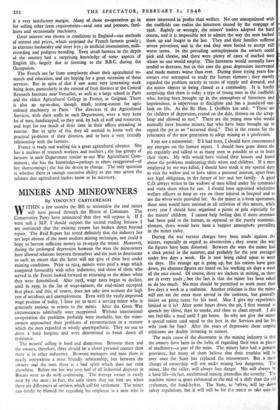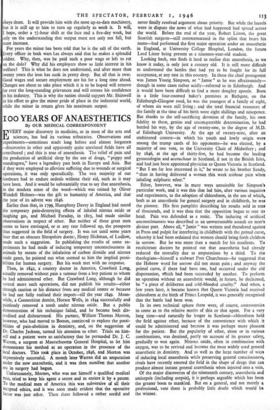MINERS AND MINEOWNERS
By VISCOUNT CASTLEREAGH
WITHIN a few months the Bill to nationalise the coal mines will have passed through the House of Commons. The Conservative Party have announced that they will oppose it. If I were still a M.P. I should support the second reading because I am convinced that the existing system has broken down beyond repair. The Reid Report has stated definitely that the industry has not kept abreast of the most modern mining technique, nor could it hope to borrow sufficient money to re-equip the mines. Moreover, during the prolonged depression between the wars the mineowners have allowed relations between themselves and the men to deteriorate to such an extent that the latter will not give of their best under existing conditions. Prior to 1914, miners were paid a wage which compared favourably with other industries, and those of them who served in the Forces looked forward to returning to the mines when they were demobilised. After 1918, wage rates began to decline, until in 1939, in the list of wage-earners, the coal-miner occupied 81st place, and this, of course, does not take into account the high rate of accidents and unemployment. Even with the vastly improved wage position of today, I have yet to meet a serving miner who is genuinely anxious to return to the mines. After the Great War circumstances admittedly were exceptional. Without international co-operation the problems probably were insoluble, but the mine- owners approached their problems of reconstruction in a manner which the men regarded as wholly unsympathetic. They set out to drive a hard bargain, and were determined to break down all resistance.
The miners' calling is hard and dangerous. Between them and the owners, therefore, there should be a closer personal contact than there is in other industries. Between managers and men there is nearly everywhere a most friendly relationship, but between the owners and the men there is a bad spirit which does not exist elsewhere. Before the last war over half of all industrial disputes in Britain were to do with coalmining. The average owner is rarely seen by the men ; in fact, the only times they see him are when there are differences of opinion which call for settlement. The miner can hardly be blamed for regarding his employer as a man who is
more interested in profits than welfare. No one unacquainted with the coalfields can realise the bitterness caused by the stoppage of 1926. Rightly or wrongly, the miners' leaders adopted the hard course, and it is impossible not to admire the way the men backed them up and fought to the last. They and their families suffered severe privations, and in the end they were forced to accept still worse terms. In the prevailing unemployment the owners could pick and choose, and there were plenty of cases of marked men whom no one would employ. This bitterness would normally have tended to decrease, but in this case the great depression intervened and made matters worse than ever. During these trying years few owners ever attempted to study the human element ; they merely regarded the problem strictly in terms of, supply and demand, and the miner objects to being classed as a commodity. It is hardly surprising that there is today a type of young man in the coalfields who, having been ,brought up in the atmosphere of bitterness and hopelessness, is impervious to discipline and has a jaundiced out- look on life. As the Rt Hon. J. Griffiths has said: "These are the children of depression, reared on the dole, thrown on the scrap- heap and allowed to rust." These are the young men who would normally have become miners, but who have been brought up to regard the pit as an "accursed thing." This is the reason for the reluctance of the new generation to adopt mining as a profession.
I am not a mineowner. If I- had been, I should have concentrated my energies on the human aspect. I should have gone down the pit regularly and talked to as many men as possible so as to learn their views. My wife would have visited their houses and heard about the problems confronting their wives and children. If a man employed by me was killed, I should have made it my special duty to visit the widow and to have taken a personal interest, apart from any legal obligation, in the future of her and her family. A good C.O. always writes to the widows of men killed under his command and visits them when he can. I should have appointed wholetime welfare officers to keep an eye on those injured in hospital and to see the wives were provided for. As the miner is a keen sportsman, these men would have assisted in all activities of this nature, while every year I should have organised a picnic or gala especially for the miners' children. I cannot help feeling that if more attention had been paid to the human, as opposed to the purely economic, element, there would have been a happier atmosphere prevailing in the mines today.
During the war various charges have been made against the miners, especially in regard to absenteeism ; they resent the way the figures have been distorted. Between the wars the miner had a slack period in the summer, and probably for the year averaged under five days a week. He is now being called upon to work six days. His average age is going up, but his rations have gone down, yet absentee figures are based on his working six days a week all the year round. Of course, there are slackers in mining, as there are in every trade ; but the fact is that the miner has been asked to do too much. No man should be permitted to work more than five days a week in a coalmine. Another criticism is that the miner will not eat the extra meat served in the canteens, but generally insists on going home for his meal. May I give my experience, limited as it is? After some hours down the pit, I first wanted to quench my thirst, then to smoke, and then to clean myself. I did not feel like a meal until I got home. So why not give the miner a special ration card equal to the best in the Services and let his wife cook for him? After the years of depression these carping criticisms are doubly irritating to miners.
The main cause Of the discontent in the mining industry is that the owners have been in the habit of regarding their men as pieces of machinery—a part of the mine. The miners have had a genuine grievance, but many of them believe that their troubles will be over once the State has replaced the mineowners. But a mere change of ownership will not make mining less dangerous. The miner, like the sailor, will always face danger. His will always be a hard life—in fact, mechanised mining intensifies the severity. The machine miner is more exhausted at the end of a shift than the 01d craftsman, the hand-heiker. The State, a; ',efcre, will lay down safety regulations, but it will still be for the miner to take care he
beys them. It will provide him with the most up-to-date machinery, but it is still up to him to turn up regularly to work it. It will, I hope, order a 71-hour shift at the face and a five-day week, but only on the understanding that output must not only not fall, but must increase. For years the miner has been told that he is the salt of the earth. Every officer in both wars has always said that he makes a splendid oldier. Why, then, was he paid such a poor wage or left to rot on the dole? Why did his employers show so little interest in his welfare? This is what he does not understand, and after more than twenty years the iron has sunk in pretty deep. But all that is over. Good wages and secure employment are his for a long time ahead. Changes are about to take place which it is to be hoped will remove
or ever the long-standing grievances and will restore his confidence in his industry. This is why the nation should support Mr. Shinwell in his effort to give the miner pride of place in the industrial world, while the miner in return gives his maximum output.



























 Previous page
Previous page